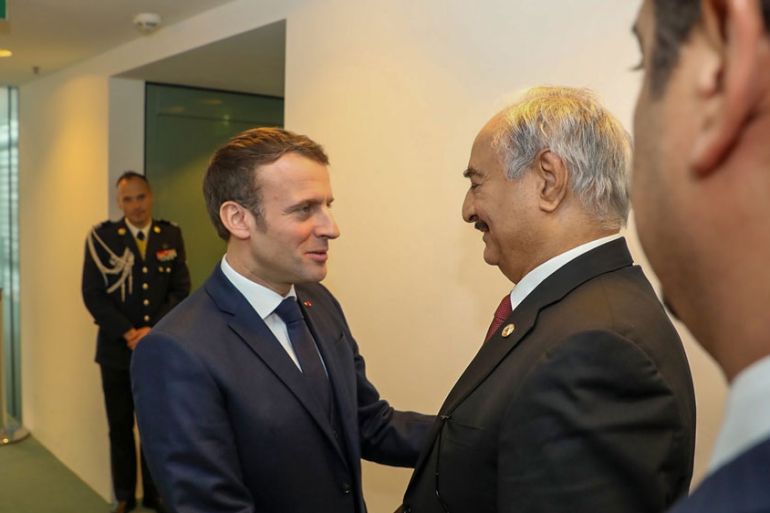Libya’s Haftar meets Macron in Paris, says ready for ceasefire
Libyan military commander tells French president he will abide by a ceasefire if UN-recognised GNA also pledges to it.

Eastern Libya-based military commander Khalifa Haftar has told French President Emmanuel Macron he will sign a ceasefire and stick to it if militias loyal to the UN-recognised government in Tripoli abide by it.
“Marshal Haftar assured us that he was committed to signing the ceasefire, but this commitment would cease if the militias do not respect it,” an official at the Elysee Palace said after Haftar met Macron in Paris on Monday. The official gave no further details.
Keep reading
list of 3 itemsUN envoy for Libya Ghassan Salame resigns, citing ‘stress’
Libya: GNA says ceasefire talks overtaken by Tripoli attacks
The unannounced meeting between Haftar and Macron came as fighting continued to rage across much of the Libyan capital’s southern outskirts.
In April 2019, Haftar launched a military campaign to wrest control of Tripoli from the United Nations-brokered Government of National Accord (GNA). The offensive was largely stalled by forces loyal to the GNA.
Increase in violence
Despite a peace conference held in Berlin in January, violence has increased in Libya, with combatants in the west and east preparing for a long conflict as foreign weapons flood in, eastern factions close oil ports, and rival alliances wrangle over revenues from Africa’s largest petroleum reserves.
Several countries backing rival factions in Libya have violated an arms embargo, according to the UN, which has previously named the United Arab Emirates, Egypt and Turkey for breaching the embargo.
After the Berlin conference, the violations increased, and the UN denounced the countries without naming them.
The UAE and Egypt support Haftar, while the GNA is backed by Turkey. France has been accused of lending political support to Haftar, but Paris has denied this.
“Haftar is one of the main actors on the Libyan political scene and must be taken into consideration,” the French presidential official said.
The official said there were no plans for Macron to meet or speak to the head of the Tripoli government, Fayez al-Sarraj.
Paris is backing the UN push for talks between the warring rivals, and Macron met separately with Haftar and al-Sarraj in Paris last May.
The standoff over oil is one of several factors that could prolong the almost year-long conflict over the capital, where the GNA last month secured military backing from Turkey, including Turkish-backed fighters from Syria.
The official said Macron had raised the issue of oil and moves to ensure the revenues serve all the population and lead to blockades of ports being lifted, but Haftar said it had nothing to do with him.